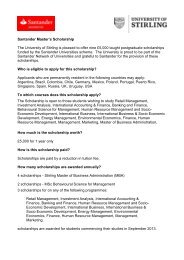Health First: An evidence-based alcohol strategy for the UK
Health First: An evidence-based alcohol strategy for the UK
Health First: An evidence-based alcohol strategy for the UK
You also want an ePaper? Increase the reach of your titles
YUMPU automatically turns print PDFs into web optimized ePapers that Google loves.
<strong>Health</strong> <strong>First</strong>: an <strong>evidence</strong>-<strong>based</strong> <strong>alcohol</strong> <strong>strategy</strong> <strong>for</strong> <strong>the</strong> <strong>UK</strong><br />
This requires that public health and community safety<br />
are prioritised in all national and local decision-making<br />
about <strong>alcohol</strong> policy.<br />
Recommendation<br />
Public health and community safety<br />
should be given priority in all public<br />
policy-making about <strong>alcohol</strong>.<br />
Partners in change<br />
As <strong>the</strong> emphasis of this report is firstly on populationlevel<br />
measures to tackle <strong>the</strong> harm from <strong>alcohol</strong>, many<br />
of our recommendations are addressed to government.<br />
However, local authorities, <strong>the</strong> NHS and <strong>the</strong> police also<br />
have major roles to play, as do schools and universities,<br />
youth agencies, sports bodies and many voluntary and<br />
shareholder returns over all o<strong>the</strong>r considerations.<br />
Likewise, <strong>the</strong> retail sector has no interest in reducing<br />
<strong>the</strong>ir sales. In fact, <strong>the</strong> discounting of supermarkets has<br />
become a key driver of <strong>alcohol</strong>-related harm. Turning<br />
a profit is also necessarily a primary concern of small<br />
businesses such as local pubs and shops.<br />
The <strong>alcohol</strong> industry’s overriding focus is on <strong>the</strong><br />
successful marketing of <strong>alcohol</strong>ic products, and it is<br />
only in this capacity that producers and retailers should<br />
be expected (indeed required) to make a contribution.<br />
For example, <strong>the</strong> industry has <strong>the</strong> expertise to produce<br />
and market low-<strong>alcohol</strong> products, to make pubs safer<br />
and less <strong>alcohol</strong>-centric, and to train staff appropriately.<br />
Such actions are valuable but <strong>the</strong>y are secondary to<br />
<strong>the</strong> population-level measures described in this report.<br />
They should never delay or replace measures that are<br />
more effective in reducing <strong>the</strong> harm from <strong>alcohol</strong>.<br />
The World <strong>Health</strong> Organisation has stated categorically<br />
that any public health interaction with commerce<br />
‘should be confined to discussion of <strong>the</strong> contribution<br />
Long term health improvement will only be achieved<br />
if <strong>the</strong> overall level of <strong>alcohol</strong> consumption in <strong>the</strong><br />
population is significantly reduced<br />
community organisations. A comprehensive approach<br />
to tackling <strong>the</strong> harm from <strong>alcohol</strong> in <strong>the</strong> <strong>UK</strong> requires<br />
not only an extensive agenda <strong>for</strong> change but also<br />
broad support from all of those who are committed to<br />
promoting public health and community safety.<br />
The British people are at <strong>the</strong> centre of this collective<br />
ef<strong>for</strong>t to trans<strong>for</strong>m our relationship with <strong>alcohol</strong>. It<br />
is <strong>the</strong>ir lives and <strong>the</strong>ir communities that suffer <strong>the</strong><br />
consequences of harmful drinking. The vision described<br />
above will only be achieved with <strong>the</strong>ir support. It is<br />
increasingly clear that this support is <strong>for</strong>thcoming and<br />
tougher action is expected by <strong>the</strong> public (chapter 9).<br />
In contrast, <strong>the</strong> <strong>alcohol</strong> industry is not a partner in<br />
change. We believe that <strong>the</strong> industry’s conflict of<br />
interest is simply too great to allow it to take on a<br />
meaningful role in reducing <strong>the</strong> harm from <strong>alcohol</strong>.<br />
Long-term health improvement will only be achieved<br />
if <strong>the</strong> overall level of <strong>alcohol</strong> consumption in <strong>the</strong><br />
population is significantly reduced. This is not an<br />
objective that <strong>the</strong> <strong>alcohol</strong> multinationals could ever<br />
endorse because <strong>the</strong>y are required by law to prioritise<br />
<strong>the</strong> <strong>alcohol</strong> industry can make to <strong>the</strong> reduction of<br />
<strong>alcohol</strong>-related harm only in <strong>the</strong> context of <strong>the</strong>ir roles<br />
as producers, distributors and marketers of <strong>alcohol</strong>,<br />
and not in terms of <strong>alcohol</strong> policy development or<br />
health promotion’ 4 .<br />
Recommendation<br />
Drinks companies should contribute<br />
to <strong>the</strong> goal of reducing <strong>alcohol</strong>-related<br />
harm only as producers, distributors and<br />
marketers of <strong>alcohol</strong>. They should not be<br />
involved in <strong>alcohol</strong> policy development or<br />
health promotion.<br />
11
















